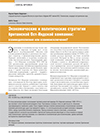Economic and Political Strategy of the British East India Company: Complementarity or Mutual exclusion?
DOI: 10.33917/es-4.162.2019.92-99
The article deals with correlation between the trade and the power nature of the East India Company (1600–1874) as a key agent of the British Empire in Asia. The main stages of its activity are traced, transformation of its strategies and goals is explained. If in the first century and a half economic and political strategies of the company complemented each other with priority of the first, then with the company’s institutional mutation in the middle of the XVIII century there emerged tension between strategies arose. The company’s coming to power in Bengal, establishment of state control over the company and the British industrial revolution not only brought the company’s political strategies to the forefront, but replaced its economic goals with political ones, transforming the company into an instrument of governing India



